VIPsight - March 2011
COMPANIES
German stock exchange and NYSE merge
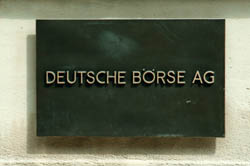 If the merger runs according to plan, by the end of 2011 the New York Stock Exchange (NYSE) Euronext and Deutsche Börse will merge to become the largest player in the global stock markets. As Deutsche Börse announced in mid-February, a global leader in derivatives trading and risk management, and the best-known and largest stock exchange for equity placements and trading, would be created. The new company would have sales of 4.1 billion euros and an EBITDA of 2.1 billion euros, said the Frankfurt stock-exchange operator. Formally, the NYSE is making a takeover bid for Deutsche Börse. Both companies will then be brought together under the umbrella of a new Dutch holding company and listed on the stock exchanges in Frankfurt, New York and Paris. It is envisaged that the new company will have two headquarters, one in the Frankfurt Green Tower and one on New York's Wall Street. The legal domicile of the holding company will be in Amsterdam. Other business sectors and executives will be located In Paris, Luxembourg and London. The new group will be led by a 17-member Governing Board. The head of Deutsche Börse, Reto Francioni, will lead the body as chairman, and his counterpart Duncan Niederauer will sit on it as CEO. Nine of the remaining Directors will then be determined by Deutsche Börse and the remaining six by NYSE Euronext. Niederauer will also head the Executive Committee, which will be composed of equal numbers of German and American members, as Chief Executive Officer (CEO), and thus be in charge of business operations. However, it was announced that these agreements to fill the bodies apply only until 2015. Thereafter, there should no longer be proportional representation rules for the structure. The merger is expected to bring annual synergies in IT, clearing and market operations as well as in management of around €300 million, and additional revenue synergies of €100 million. Observers expect that the trading system Xetra will also fall victim to the merger, as in future there should only be a single order book. While NYSE shareholders are to be offered an exchange of shares in the ratio of one old share for 0.47 new shares, the German exchange's shareholders can exchange their papers one to one. Thus, Deutsche Börse shareholders will hold 60 percent of the shares of the new company and the NYSE's shareholders the remaining 40 percent. Observers warn, however, that since only 17 percent of the shares of Deutsche Börse are actually held by German investors, and almost two thirds of the remaining shares are in the hands of Anglo-Saxon shareholders, the American and British owners will in fact form the majority in the new company. Nevertheless, shareholder lawsuits directed against the supposedly inadequate exchange offer have already been filed In the U.S. Both the shareholders and the regulators must still approve the transaction. If one of the two future partners were to back down, it would face a penalty of €250 million. The name of the new group is more controversial. Even after the merger, the new company can remain listed on the DAX, if the trade turnover focus on the Frankfurt Stock Exchange is achieved.
If the merger runs according to plan, by the end of 2011 the New York Stock Exchange (NYSE) Euronext and Deutsche Börse will merge to become the largest player in the global stock markets. As Deutsche Börse announced in mid-February, a global leader in derivatives trading and risk management, and the best-known and largest stock exchange for equity placements and trading, would be created. The new company would have sales of 4.1 billion euros and an EBITDA of 2.1 billion euros, said the Frankfurt stock-exchange operator. Formally, the NYSE is making a takeover bid for Deutsche Börse. Both companies will then be brought together under the umbrella of a new Dutch holding company and listed on the stock exchanges in Frankfurt, New York and Paris. It is envisaged that the new company will have two headquarters, one in the Frankfurt Green Tower and one on New York's Wall Street. The legal domicile of the holding company will be in Amsterdam. Other business sectors and executives will be located In Paris, Luxembourg and London. The new group will be led by a 17-member Governing Board. The head of Deutsche Börse, Reto Francioni, will lead the body as chairman, and his counterpart Duncan Niederauer will sit on it as CEO. Nine of the remaining Directors will then be determined by Deutsche Börse and the remaining six by NYSE Euronext. Niederauer will also head the Executive Committee, which will be composed of equal numbers of German and American members, as Chief Executive Officer (CEO), and thus be in charge of business operations. However, it was announced that these agreements to fill the bodies apply only until 2015. Thereafter, there should no longer be proportional representation rules for the structure. The merger is expected to bring annual synergies in IT, clearing and market operations as well as in management of around €300 million, and additional revenue synergies of €100 million. Observers expect that the trading system Xetra will also fall victim to the merger, as in future there should only be a single order book. While NYSE shareholders are to be offered an exchange of shares in the ratio of one old share for 0.47 new shares, the German exchange's shareholders can exchange their papers one to one. Thus, Deutsche Börse shareholders will hold 60 percent of the shares of the new company and the NYSE's shareholders the remaining 40 percent. Observers warn, however, that since only 17 percent of the shares of Deutsche Börse are actually held by German investors, and almost two thirds of the remaining shares are in the hands of Anglo-Saxon shareholders, the American and British owners will in fact form the majority in the new company. Nevertheless, shareholder lawsuits directed against the supposedly inadequate exchange offer have already been filed In the U.S. Both the shareholders and the regulators must still approve the transaction. If one of the two future partners were to back down, it would face a penalty of €250 million. The name of the new group is more controversial. Even after the merger, the new company can remain listed on the DAX, if the trade turnover focus on the Frankfurt Stock Exchange is achieved.
Springer takes over Seloger
Actually Bernard Arnault, France's richest man, had rejected the offer by the Axel Springer publishing house for the French Internet real-estate site Seloger.com as undervalued. The Berlin-based media house has finally raised its bid of €34 by twelve percent to €38.05 per share. Arnault, major owner of luxury goods group LVMH, came round in early February, according to Paris business newspaper La Tribune, and signalled he would deliver to Springer his share of a good nine percent. Were all the Seloger shares offered to Springer, the newspaper publisher would have to lay 633 million euros on the table. That would make the acquisition the biggest the Group has ever made in the Internet field. The offer is open till 23 February. In order to take over the portal, Springer must purchase at least 50.01 percent of the shares. The Berliners have already been guaranteed 12.4 percent by the company's founders.
ThyssenKrupp has holes to fill
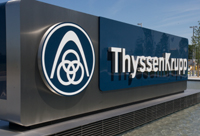 The problems with the launch of the new plant in Brazil will not let ThyssenKrupp go. Not only did the construction of the two new factories in Brazil and the U.S. State of Alabama end by swallowing up some ten billion euros, much more expensive than foreseen; the Essen steel giant now also has to make concessions to the environmental authorities for its Brazilian subsidiary CSA. In the Brazilian plant a dust extraction system for the cast-iron cooling pool and a second crane system have to be built, for about €45 million. In mid-February ThyssenKrupp submitted its quarterly report, and revised the outlook for the full year. The start-up and environmental problems in Brazil and the U.S. will mean a loss in EBIT in the fiscal year in the high hundreds of millions, and not as previously announced the middle hundreds. As the reason, the ThyssenKrupp chief named delayed commissioning of the coking plant, which meant expensive coking coal had to be purchased. In addition, the Brazilian plant produces less crude steel than planned, so that crude steel too had to be purchased externally. The bottom line is that the Thyssen management still expects an EBIT for the full year of two billion euros.
The problems with the launch of the new plant in Brazil will not let ThyssenKrupp go. Not only did the construction of the two new factories in Brazil and the U.S. State of Alabama end by swallowing up some ten billion euros, much more expensive than foreseen; the Essen steel giant now also has to make concessions to the environmental authorities for its Brazilian subsidiary CSA. In the Brazilian plant a dust extraction system for the cast-iron cooling pool and a second crane system have to be built, for about €45 million. In mid-February ThyssenKrupp submitted its quarterly report, and revised the outlook for the full year. The start-up and environmental problems in Brazil and the U.S. will mean a loss in EBIT in the fiscal year in the high hundreds of millions, and not as previously announced the middle hundreds. As the reason, the ThyssenKrupp chief named delayed commissioning of the coking plant, which meant expensive coking coal had to be purchased. In addition, the Brazilian plant produces less crude steel than planned, so that crude steel too had to be purchased externally. The bottom line is that the Thyssen management still expects an EBIT for the full year of two billion euros.
Puma corrected
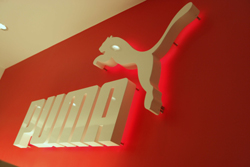 As sports-goods manufacturer Puma submitted its figures for fiscal year 2010 in mid-February and thus opened the reporting season, management had also to admit errors in financial statements for the years 2009 and earlier. In the Greek subsidiary Puma Hellas SA fraudulent acts were discovered, the statement said. This had led to errors in the consolidated statements as of 31 December 2009 and in previous years. The net equity in the financial statements for 2009 was too high by €106.5 million and consolidated net profit by €48.6 million. Earnings per share was consequently too high by €3.22. Assets were accounted for around €89.1 million euros too high and debt €17.4 million too low. In the Puma AG financial statements, claims against the subsidiary Puma Hellas would have to be adjusted downwards by €76.3 million. That meant PUMA AG's equity was set too high by this amount.
As sports-goods manufacturer Puma submitted its figures for fiscal year 2010 in mid-February and thus opened the reporting season, management had also to admit errors in financial statements for the years 2009 and earlier. In the Greek subsidiary Puma Hellas SA fraudulent acts were discovered, the statement said. This had led to errors in the consolidated statements as of 31 December 2009 and in previous years. The net equity in the financial statements for 2009 was too high by €106.5 million and consolidated net profit by €48.6 million. Earnings per share was consequently too high by €3.22. Assets were accounted for around €89.1 million euros too high and debt €17.4 million too low. In the Puma AG financial statements, claims against the subsidiary Puma Hellas would have to be adjusted downwards by €76.3 million. That meant PUMA AG's equity was set too high by this amount.
MAN in bribery troubles
 The corruption scandal at commercial vehicle manufacturer MAN is spreading. Its former subsidiary Ferrostaal is demanding €103 million back from the Essen commercial-vehicle manufacturers. This sum had been removed unlawfully by the then parent in 1999-2008 under the existing profit transfer and control agreement, argues the industry service provider. To get orders, the plant manufacturer had paid bribes for years, thus making profits that have now been exposed as illegal. Ferrostaal has corrected its accounts for the years in question because of the corruption scandal at the former parent. In the 2009 account, the company now lists the demand for €103 million. But as if that were not enough: in 2009 MAN had sold 70 percent of Ferrostaal to the Arab state fund IPIC. IPIC is now calling for a discount on the 30 percent of the Ferrostaal shares outstanding, and is even threatening rescission of the sale in the extreme case. There is also dispute as to who should pay the threatened fines on Ferrostaal. The Munich prosecutors have demanded €200 million if the investigations ongoing against the company since 2009 are to be suspended. The Ferrostaal problems have long been boiling up at MAN too: instead of presenting the annual report for 2010 on 1 March, the commercial-vehicle manufacturer will not publish its annual accounts until 21 March.
The corruption scandal at commercial vehicle manufacturer MAN is spreading. Its former subsidiary Ferrostaal is demanding €103 million back from the Essen commercial-vehicle manufacturers. This sum had been removed unlawfully by the then parent in 1999-2008 under the existing profit transfer and control agreement, argues the industry service provider. To get orders, the plant manufacturer had paid bribes for years, thus making profits that have now been exposed as illegal. Ferrostaal has corrected its accounts for the years in question because of the corruption scandal at the former parent. In the 2009 account, the company now lists the demand for €103 million. But as if that were not enough: in 2009 MAN had sold 70 percent of Ferrostaal to the Arab state fund IPIC. IPIC is now calling for a discount on the 30 percent of the Ferrostaal shares outstanding, and is even threatening rescission of the sale in the extreme case. There is also dispute as to who should pay the threatened fines on Ferrostaal. The Munich prosecutors have demanded €200 million if the investigations ongoing against the company since 2009 are to be suspended. The Ferrostaal problems have long been boiling up at MAN too: instead of presenting the annual report for 2010 on 1 March, the commercial-vehicle manufacturer will not publish its annual accounts until 21 March.
Hapag Lloyd to go public?
![]() For a long time tourism and shipping group TUI has been wanting to separate from its shipping subsidiary Hapag-Lloyd. In March 2009, the Hanoverians had thus passed 50.2 percent of the shares in the world's fifth-largest shipping company to the Albert Ballin consortium, which includes both logistics company Kuehne and the City of Hamburg. The search for a strategic investor continued meanwhile, but remained elusive. Now the economic environment is so good that a public offering of the Hamburg shipping line is scheduled for 15 April, writes the Financial Times Deutschland. It could become the largest German IPO since 2007. It is unclear what portion of the Hapag-Lloyd shares will be sold via the stock market. However, it is expected that TUI could dispose of 35 to 40 percent. The IPO could bring between one and one and a half billion euros. Hapag-Lloyd is valued at a total of three to three and a half billion euros. The TUI's supervisory board is to agree to the IPO on 3 March. Alternatively, the capital could be increased by 350 to 400 million euros, increasing the free float to 30 to 40 percent. A TUI spokesman told Financial Times Deutschland, however, that nothing had been decided yet. Meanwhile the HSH Nordbank, also part of the consortium, signalled it would be interested in selling off its three percent in a flotation.
For a long time tourism and shipping group TUI has been wanting to separate from its shipping subsidiary Hapag-Lloyd. In March 2009, the Hanoverians had thus passed 50.2 percent of the shares in the world's fifth-largest shipping company to the Albert Ballin consortium, which includes both logistics company Kuehne and the City of Hamburg. The search for a strategic investor continued meanwhile, but remained elusive. Now the economic environment is so good that a public offering of the Hamburg shipping line is scheduled for 15 April, writes the Financial Times Deutschland. It could become the largest German IPO since 2007. It is unclear what portion of the Hapag-Lloyd shares will be sold via the stock market. However, it is expected that TUI could dispose of 35 to 40 percent. The IPO could bring between one and one and a half billion euros. Hapag-Lloyd is valued at a total of three to three and a half billion euros. The TUI's supervisory board is to agree to the IPO on 3 March. Alternatively, the capital could be increased by 350 to 400 million euros, increasing the free float to 30 to 40 percent. A TUI spokesman told Financial Times Deutschland, however, that nothing had been decided yet. Meanwhile the HSH Nordbank, also part of the consortium, signalled it would be interested in selling off its three percent in a flotation.
Government still empty-handed
 The Committee of Experts set up by the federal government mid last year recommends that the federal government get rid as soon as possible of its silent partnership with Commerzbank. After the conversion of the silent partnership into shares the federal government should sell the entire stake to a strategic investor, the experts said in mid February. The weekly newspaper Die Zeit quoted the draft as saying the shares should be sold to an investor who would be willing to pay an additional cost for the check option. If the federal government converted its silent contributions of 16.4 billion euros, it would hold about 79 percent of the Frankfurt bank. Meanwhile Commerzbank CEO Martin Blessing announced that his institution will begin this year to repay the federal government's silent holdings. Initally 1.6 billion euros were under discussion. Also controversial are the bank's interest and bonus payments. For 2010, the Frankfurt institution will report earnings again, though not in the financial statement, which governs the servicing of the interest on the silent partnership. Here, a proposed billion write-down on real-esate financier Eurohypo will impinge negatively. Although the bank will pay no interest on the silent partnership in 2010 either, the employees are to receive a bonus for the past year in the low three-figure millions. The new compensation model had been agreed with the bank rescue fund SoFFin, a Commerzbank spokesman told the German Press Agency. A spokesman for Finance Minister Wolfgang Schäuble (CDU) also pointed out the legality of the bonus payments. The new bonus rules of the Bank Restructuring Act do not come in till 2011, the ministry said.
The Committee of Experts set up by the federal government mid last year recommends that the federal government get rid as soon as possible of its silent partnership with Commerzbank. After the conversion of the silent partnership into shares the federal government should sell the entire stake to a strategic investor, the experts said in mid February. The weekly newspaper Die Zeit quoted the draft as saying the shares should be sold to an investor who would be willing to pay an additional cost for the check option. If the federal government converted its silent contributions of 16.4 billion euros, it would hold about 79 percent of the Frankfurt bank. Meanwhile Commerzbank CEO Martin Blessing announced that his institution will begin this year to repay the federal government's silent holdings. Initally 1.6 billion euros were under discussion. Also controversial are the bank's interest and bonus payments. For 2010, the Frankfurt institution will report earnings again, though not in the financial statement, which governs the servicing of the interest on the silent partnership. Here, a proposed billion write-down on real-esate financier Eurohypo will impinge negatively. Although the bank will pay no interest on the silent partnership in 2010 either, the employees are to receive a bonus for the past year in the low three-figure millions. The new compensation model had been agreed with the bank rescue fund SoFFin, a Commerzbank spokesman told the German Press Agency. A spokesman for Finance Minister Wolfgang Schäuble (CDU) also pointed out the legality of the bonus payments. The new bonus rules of the Bank Restructuring Act do not come in till 2011, the ministry said.
Berlin wants to keep with EADS
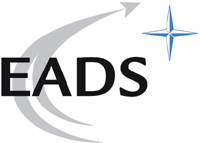 Daimler wants to withdraw from EADS. The Stuttgarters still directly hold 15 percent of the shares, but the German car manufacturer has 22.5 percent of the voting rights. On the French side Lagardère is involved with 15 percent and the State with 7.5 percent. The federal government had at its meeting on 23 February still not agreed on a common line for securing its longer-term influence on the ownership circle of the aerospace company. Particularly contentious is whether the German government, like the French, will play an active role as major shareholder. The coalition partners are, however, at least agreed that everything should be done to secure Franco-German balance. The Financial Times speculates that the politically and technologically sensitive parent company of aircraft manufacturer Airbus could itself buy the car company’s shares. Berlin then need not even buy the shares itself, but would still retain its influence.
Daimler wants to withdraw from EADS. The Stuttgarters still directly hold 15 percent of the shares, but the German car manufacturer has 22.5 percent of the voting rights. On the French side Lagardère is involved with 15 percent and the State with 7.5 percent. The federal government had at its meeting on 23 February still not agreed on a common line for securing its longer-term influence on the ownership circle of the aerospace company. Particularly contentious is whether the German government, like the French, will play an active role as major shareholder. The coalition partners are, however, at least agreed that everything should be done to secure Franco-German balance. The Financial Times speculates that the politically and technologically sensitive parent company of aircraft manufacturer Airbus could itself buy the car company’s shares. Berlin then need not even buy the shares itself, but would still retain its influence.
DSW against discharge at Hochtief
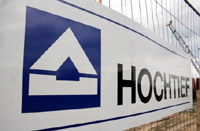 As Actividades de Construcción y Servicios (ACS) announced, after the end of the bid and acquisitions on the stock market, it currently held 33.49 percent of Hochtief. Hochtief's CEO Herbert Lütkestratkötter has now responded, and replaced the previously strict defence against the ACS attack by a dual strategy. He now wants to combine dialogue with ACS chief Florentino Pérez with a plan to increase the Essen MDAX company’s share price so much that the purchase is too expensive for the Spaniards. Lütkestratkötter referred in this context to the merger of subsidiaries into the new Hochtief Solutions and the planned concessions sale, in which investor interest is already high. In addition, hopes are placed in strong attendance at the next general meeting on 12 May, when the capital side of the Supervisory Board will be elected. Higher share prices would make it difficult for ACS to assert influence here already.
As Actividades de Construcción y Servicios (ACS) announced, after the end of the bid and acquisitions on the stock market, it currently held 33.49 percent of Hochtief. Hochtief's CEO Herbert Lütkestratkötter has now responded, and replaced the previously strict defence against the ACS attack by a dual strategy. He now wants to combine dialogue with ACS chief Florentino Pérez with a plan to increase the Essen MDAX company’s share price so much that the purchase is too expensive for the Spaniards. Lütkestratkötter referred in this context to the merger of subsidiaries into the new Hochtief Solutions and the planned concessions sale, in which investor interest is already high. In addition, hopes are placed in strong attendance at the next general meeting on 12 May, when the capital side of the Supervisory Board will be elected. Higher share prices would make it difficult for ACS to assert influence here already.
It could also get uncomfortable for Klaus Wiesehügel at the shareholder meeting. German shareholder association DSW will oppose discharge to the Hochtief supervisory-board member. DSW bases its position on a communication dated 16 February with an "apparently not agreed pushing by the IG-Bau [trade union] chief" in connection with the ACS offer. The union is said to have already held secret negotiations with the ACS-led group's top management before Christmas, while the Hochtief group was still opposing a takeover. The Works Council sees this approach as a betrayal.















